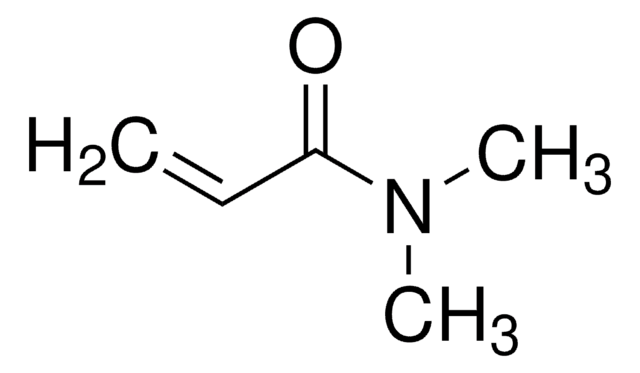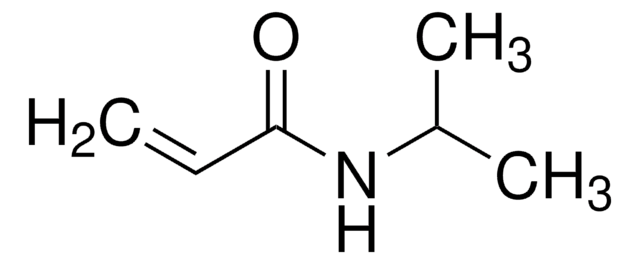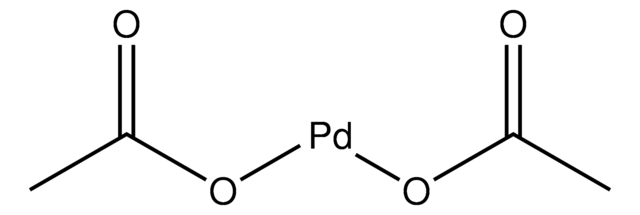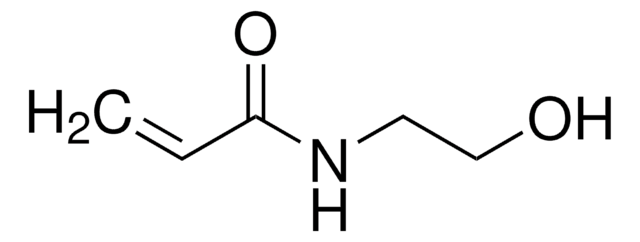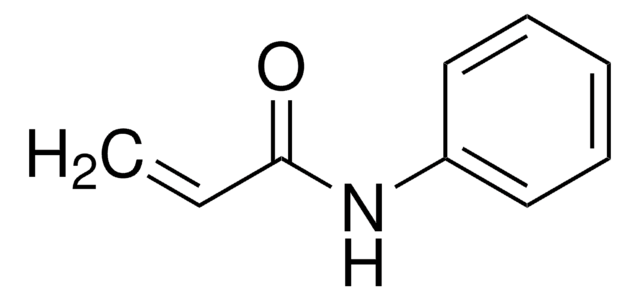411779
N-tert-Butylacrylamide
97%
Synonym(s):
N -(1,1-Dimethylethyl)-2-propenamide, N -t -Butylacrylamide
Sign Into View Organizational & Contract Pricing
All Photos(2)
About This Item
Linear Formula:
CH2=CHCONHC(CH3)3
CAS Number:
Molecular Weight:
127.18
Beilstein:
1742331
EC Number:
MDL number:
UNSPSC Code:
12162002
PubChem Substance ID:
NACRES:
NA.23
Recommended Products
Assay
97%
form
solid
mp
126-129 °C (lit.)
SMILES string
CC(C)(C)NC(=O)C=C
InChI
1S/C7H13NO/c1-5-6(9)8-7(2,3)4/h5H,1H2,2-4H3,(H,8,9)
InChI key
XFHJDMUEHUHAJW-UHFFFAOYSA-N
Looking for similar products? Visit Product Comparison Guide
General description
N-tert-Butylacrylamide (nTBA) belongs to the class of hydrophobic acrylamides which can be synthesized by Ritter reaction and optimized by using N-tert-butyl acetate and acetic acid.
Application
nTBA is temperature sensitive monomers that can be potentially used in drug delivery systems, dewatering of proteins, and immobilization of cells. It can be used in the preparation of poly(nTBA) based copolymeric hydrogels for bovin serum albumin.
Signal Word
Warning
Hazard Statements
Hazard Classifications
Acute Tox. 4 Oral
Storage Class Code
11 - Combustible Solids
WGK
WGK 3
Flash Point(F)
Not applicable
Flash Point(C)
Not applicable
Personal Protective Equipment
dust mask type N95 (US), Eyeshields, Gloves
Choose from one of the most recent versions:
Already Own This Product?
Find documentation for the products that you have recently purchased in the Document Library.
Customers Also Viewed
Lucia Cenci et al.
Talanta, 178, 772-779 (2017-11-16)
Nanosized Molecularly Imprinted Polymers (nanoMIPs) are designed artificial nanoreceptors with a predetermined selectivity and specificity for a given analyte, lately proposed as a replacement to antibodies in immunoassays. The nanoMIP-plate preparation based on nanoparticle adsorption was studied with the aim
RAFT polymerization of hydrophobic acrylamide derivatives
de Lambert B, et al.
Polymer, 46(3), 623-637 (2005)
Hossein Hosseinzadeh et al.
International journal of biological macromolecules, 113, 859-868 (2018-03-11)
In the present work, a novel magnetic chitosan/graphene oxide nanocomposite (MCGON) was synthesized for the removal of Cu2+ from aqueous solutions. The adsorbent was composed of graphene oxide (GO) modified by ethylenediamine (ED), Fe3O4 nanoparticles and chitosan-g-poly(acrylic acid-co-2-acrylamido-2-methylpropane sulfonic acid)
Yuma Nagasawa et al.
Polymers, 11(6) (2019-06-13)
The chemisorption process with amines is the major separation and recovery method of CO2 because of its high processing capacity and simplicity. However, large energy consumption for the desorption of CO2 is also associated with the process. To develop a
Lei Cao et al.
Journal of colloid and interface science, 524, 434-444 (2018-04-21)
Synthetic polymer fluid loss additive (FLA), an important type of admixture, was broadly applied in modern well cementation. However, the filter loss volume and fluidity of cement pastes containing polymer-FLA would deteriorate remarkably when sea water was used in mixing
Our team of scientists has experience in all areas of research including Life Science, Material Science, Chemical Synthesis, Chromatography, Analytical and many others.
Contact Technical Service